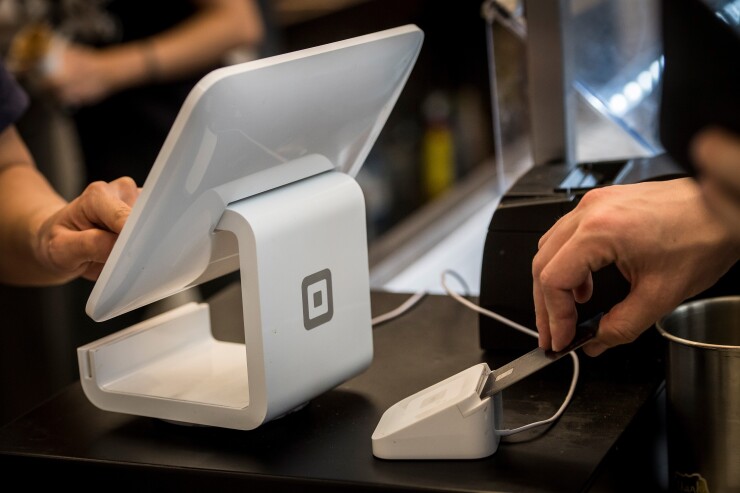
Block is taking Visa and Mastercard to court, claiming the card networks are using their power to unfairly influence fees — an argument that comes as Congress considers updating rules to encourage more competition in the payments market.
"Visa and Mastercard have used a series of agreements and practices to fix prices, avoid competition and protect their market power," Block contends in its
Block alleges Visa and Mastercard enforce "Honor All Cards" rules, meaning any merchant that accepts a bank's general-purpose card must accept general-purpose cards for all other banks. "These 'all or nothing rules' constitute agreements among the banks to not compete for merchants' acceptance of their general purpose cards," Block said in its suit.
The lawsuit comes at a time when Sen. Dick Durban, D-Ill., is leading a new bipartisan effort to
Block, which for years has sold hardware that enables businesses to accept card payments, operates under a structure in which merchants do not pay Visa and Mastercard fees directly. The merchants
"Block is in a fairly unique situation here," said Aaron Press, research director for Worldwide Payment Strategies at IDC. "As the merchant of record for most of their clients, they are effectively both a merchant and a processor."
A reduction in card network interchange could increase Block's margins and potentially lower the fees Block charges its client merchants, although the company would almost certainly price its service at the highest level the market will bear, according to Press.
Large merchants often threaten the card networks over fees. Walmart and Visa have waged
"The Block lawsuit can also be a vehicle for negotiating better terms," said Carol Van Cleef, CEO of Luminous Group.
Block, Visa and Mastercard did not provide comment on the suit or any agreement among the firms.
Block can plausibly argue it is fighting on its clients' behalf because of it's merchant of record status, but it also earns interchange from its Cash App debit card, according to Eric Grover, a principal at Intrepid Ventures. As such Block has its own options to reduce the interchange fees it collects, Grover said. "It could issue Cash App debit cards through an issuer with more than $10 billion in assets and earn lower capped interchange," he said.
Block's complaint also focuses on Visa's Fixed Acquirer Network Fee (FANF) and the Mastercard Merchant Location Fee (MLF), which are levies based on a merchant's number of locations. Block asserts that Visa's FANF, which has existed since 2012 and Mastercard's MLF, which has existed since 2017, creates an environment in which the only way to avoid fees is to not support Visa or Mastercard, which would remove the payment options that most consumers use.
"The FANF and MLF are structured such that they can be offset only by committing to route substantial transaction volume over the more expensive Visa and Mastercard networks," Block said in its suit, adding that both FANF and MLF fees have increased over time.
Visa and Mastercard use FANF and MLF revenue to offset the network steering provisions imposed by the Durbin Amendment, according to Aaron McPherson, principal at AFM Consulting, referring to the portion of the post-2008 financial crisis Dodd-Frank law that requires debit transactions have the option to be routed over rails beyond Visa and Mastercard.
"FANF and MLF hit particularly hard on a payment facilitator like Block, because of all the 'locations' of its various merchant customers," McPherson said, noting Block specifically calls for an injunction against FANF and MLF in its 'Prayer for Relief' in the suit. "This is the first time I have seen someone sue over FANF and MLF. Usually they just focus on the interchange, which Block does, too."
Even if Congress doesn't share Block's concerns, other parts of the government, such as the Federal Trade Commission, may be persuaded to take action if they agree that the card networks are harming competition, McPherson said.
"This lawsuit could focus more attention on FANF and MLF by regulators and politicians, and perhaps that is the point," McPherson said.






